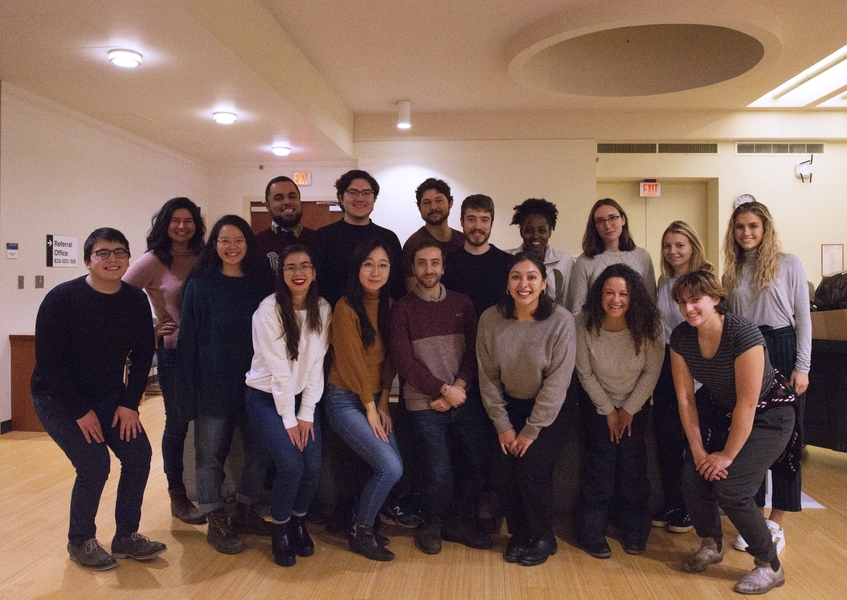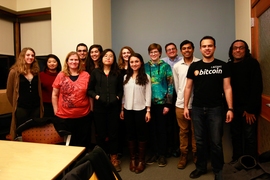A meditative nature retreat, healthy cooking projects, and several initiatives advancing diversity, equity, and inclusion are coming to MIT courtesy of the MindHandHeart Innovation Fund. Sponsored by the Office of the Chancellor, the MindHandHeart Innovation Fund offers grants of up to $10,000 to advance ideas that make MIT a more welcoming, inclusive, and healthy place.
This cycle, MindHandHeart (MHH) awarded $51,534 to 21 projects selected from 45 applications. Seventy-six percent of awarded projects are spearheaded by students and 24 percent are driven by staff members.
Applications were reviewed by Chancellor Cynthia Barnhart, MHH’s Faculty Chair Roz Picard, members of MindHandHeart’s volunteer coalition comprising MIT students, faculty, and staff members as well as representatives from Active Minds, the Undergraduate Association Wellness Committee, the Undergraduate Association Innovation Committee, and the Graduate Student Council.
“It’s wonderful to see community members using their many talents to launch projects that bring more ‘heart’ to MIT,” says Barnhart. “From the development of proposals to the review process to the implementation of projects, the Innovation Fund is truly a community-building effort.”
Nine projects aim to build community and advance diversity, equity, and inclusion at MIT.
The “Graduate Student Council Diversity, Equity, and Inclusion (GSC-DEI) Fellows Program + gradCommunity Dialogues Series” seeks to make MIT a more equitable, inclusive, and engaging place through peer-to-peer dialogues.
One of the project’s founders, graduate student Bianca Lepe, describes the project, saying “The GSC DEI Graduate Fellows and subsequent gradCommunity Dialogues will give students the space to have thoughtful conversations across social and cultural differences. Students will gain a better understanding of how to identify inequities, engage in challenging discussions about inequities, and lower the barrier to engage comfortably in these conversations in their classrooms and research groups. We hope that this will help transform MIT’s climate by giving individuals a space to learn and empathize.”
Another graduate student-led project, “Spill the Tea” is a monthly program connecting graduate students of color and their allies around tea for open-ended conversation, connection to MIT resources, and a sense of belonging. The goal of the “Aunties and Uncles Freshman Mentorship Program” is to strengthen the support network for first-year students in the MIT African Students Association. “Noches de Cultura” is bringing a series of events showcasing Latin American arts and culture to campus to foster spaces of community and engagement.
Organized by the Communications Forum, “Sexual Harassment Culture at MIT” is a moderated panel exploring how harassment affects the MIT community, the experiences of survivors, and what institutional change looks like. The student-driven “MIT Women in Econ Lunch” project is a series of lunches designed to support women in the Department of Economics.
“Queer Film and Crafting Nights” is a monthly event series bringing together LGBTQ+ individuals and allies within the Department of Biology. The “VISTA Holiday Celebration” outlines a plan to bring international visiting students and graduate students together to mark the holiday season and reduce potential isolation.
“There’s a SPXCE for Everyone” is a campaign to host events in areas that are traditionally not seen as being inclusive of certain marginalized identity groups. “There’s a SPXCE for Everyone” organizer and Assistant Director of Intercultural Engagement for LBGTQ+ Services Lauryn McNair describes the project, saying “The takeover campaign is to extend the inclusive environment for students to be their authentic selves while experiencing events off campus in spaces that are traditionally populated by dominant identities. The MHH Innovation Fund allows SPXCE to take students to see a classical music performance at Symphony Hall with other students in their communities, to 'take over' the space, and to learn more about how diversity and inclusion is shaping Symphony Hall performances.”
A number of newly funded projects promote wellness and self-care.
Spearheaded by Graduate Resident Advisor in MacGregor House Kaitlyn Gee, “Discovering and Personalizing Self-Care: A Series of Workshops for MIT Students” encourages undergraduate residents of MacGregor to develop self-care practices through events focused on painting, nature, and food. “Natural Inspiration,” led by Integrated Design and Management student Western Bonime, is a nature retreat where participants will meditate, take mindful walks, and admire the natural world.
Spearheaded by Buddhist Chaplain Tenzin Priyadarshi, the “Gratitude Project” motivates MIT community members to pause, reflect, and cultivate gratitude. “Mindful MIT” is an initiative to distribute 120 mindfulness journals to Sloan students, along with materials advertising campus support resources. “IDSS Presents: Intelligence Demands Super Relaxation” is a student-led project to add de-stressing tools and furniture to Institute for Data, Systems, and Society common spaces.
Led by Hindu Chaplain Sadananda Dasa, “Handling Negativity” consists of a series of workshops where participants will learn techniques from ancient Vedic texts to confront negativity and cultivate positive thoughts.
Four projects are designed to build community and promote healthy eating. “EZhealth” is a student-led group hosting cooking classes in independent living groups. “ChopStirHack” is a student-led food magazine, building off the success of their cookbook. “Recipes from Home” is a cookbook project that seeks to share cultural and culinary traditions within the Department of Urban Studies and Planning’s 2020 Master in City Planning graduating class. Lastly, the “Cambridge Culinary Cooking Class” brings students and faculty members in the Department of Chemical Engineering together for an interactive cooking class.
Other projects include the “Graduate Student Book Exchange,” an event where students can connect over their favorite books, and “Save TFP: Grand Care Package Event,” a large-scale event where undergraduates will make care packages for their friends during Random Acts of Kindness Week in March.
MHH has supported 138 Innovation Fund projects to date, 17 of which are now self-sustaining.
The next MindHandHeart Innovation Fund cycle opens March 1-31. MIT staff, faculty, students, and students’ spouses with ideas to make MIT a more welcoming, inclusive, and healthy place are encouraged to apply.









